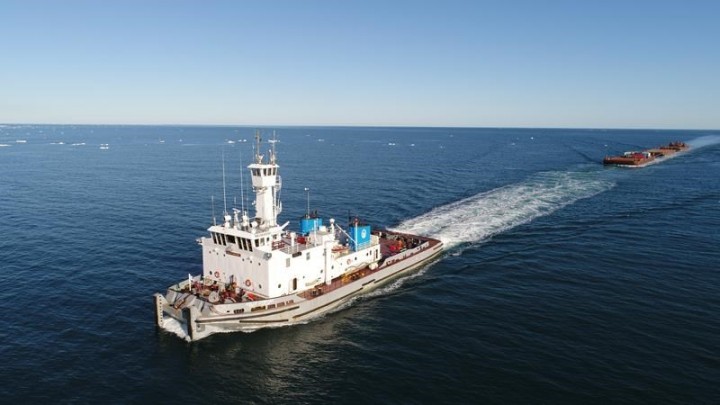TULITA, N.W.T. — The Northwest Territories government says damage to a fuel hose played a role in delaying this year’s shipping season for resupply barges headed to coastal communities.
The N.W.T. government announced earlier this month that the barge for Sachs Harbour, the territory’s northernmost community, would be cancelled. It said bad weather and a late start to the sailing season due to climate change, delayed buoy placement by the Canadian Coast Guard and flooding in Hay River and Inuvik this spring were to blame.
In an email to The Canadian Press, Laura Busch, a spokesperson for the Department of Infrastructure, added that vandalism to a fuel hose also delayed the shipping schedule by six to seven days.
“Despite the myriad challenges, some of the most challenging and unrelenting have been the extreme weather events linked to climate change,” Busch wrote, highlighting flood conditions, low water levels, and changing wind and wave conditions.
The RCMP confirmed it investigated suspected vandalism to a fuel delivery hose from the barge to a storage facility in Tulita that was reported on Aug. 6. It said fuel delivery was suspended until a replacement hose arrived.
RCMP said its investigation did not identify any suspects. Suggestions to improve security were relayed to Marine Transportation Services, which provides barging services in the territory.
Many coastal communities in the North rely on annual barges to move freight, food and fuel as they are not connected to the South by road or rail and transporting items by air is costly. The owner of the only store in Sachs Harbour has said it had been getting low on some supplies and that several residents were also waiting on snowmobiles in a community where many hunt for food.
The N.W.T. government said grocery items from the barge, which is now in Paulatuk, N.W.T., were flown into Sachs Harbour on Sunday. It said it plans to fly necessary fuel and most of the deck cargo aboard the barge to Sachs Harbour in November and December. Some larger items, and those that don’t need to be immediately shipped, will be stored in Paulatuk until next year’s shipping season.
The territorial government said none of the additional costs for airlifting items will be passed on to residents in the community.
“We know this is frustrating for the residents of the community and we are grateful for everyone’s patience as we work through the details necessary to prepare for an airlift,” Busch wrote.
The territorial government took over Marine Transportation Services in 2016 after its previous owner declared bankruptcy. It provides barging services from the Port of Hay River on Great Slave Lake to locations along the Mackenzie River and in the Western Arctic. It completed marine resupply for nine N.W.T. communities and one Nunavut community this year, along with private contracts.
The Department of Infrastructure has been “engaging in discussions” with marine operators and Indigenous and community governments to determine if Marine Transportation Services operations could benefit from more private-sector involvement. The department said there was “some interest” after it held a request for expressions of interest in April.
The territorial government previously cancelled barges for Kugluktuk and Cambridge Bay in Nunavut and Paulatuk in early October 2018, citing impassable ice conditions. It was later revealed a bad fuel shipment that had to be returned from Alberta also played a role in delaying the barges. Some items were flown into the communities while others, such as vehicles and construction materials, were stored in Inuvik over winter.
The N.W.T. government settled three lawsuits outside of court this August, which were filed in Federal Court by two companies in Cambridge Bay and one in Paulatuk seeking damages related to the barge cancellations claiming their cargo was damaged. The government filed statements of defence and counterclaims in all three cases.
This report by The Canadian Press was first published Oct. 24, 2022.
— By Emily Blake in Yellowknife.
This story was produced with the financial assistance of the Meta and Canadian Press News Fellowship.
The Canadian Press
